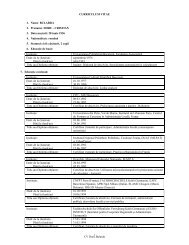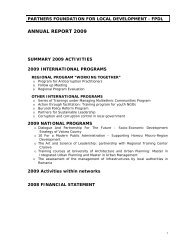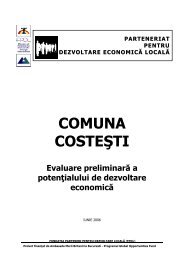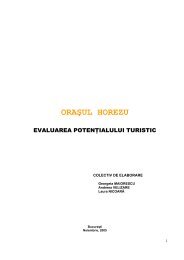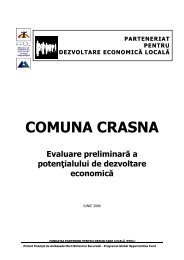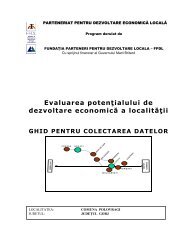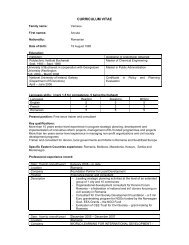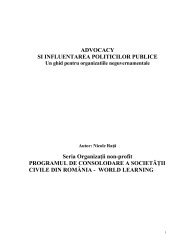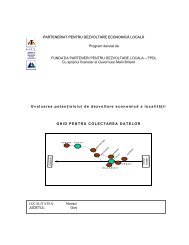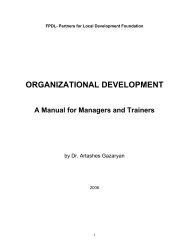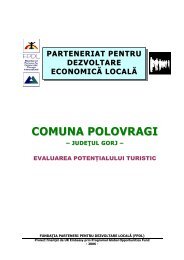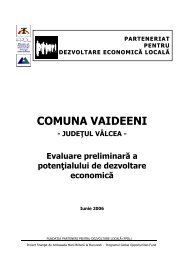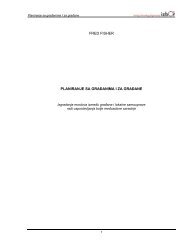PARTNERS FOUNDATION FOR LOCAL DEVELOPMENT - FPDL
PARTNERS FOUNDATION FOR LOCAL DEVELOPMENT - FPDL
PARTNERS FOUNDATION FOR LOCAL DEVELOPMENT - FPDL
- No tags were found...
You also want an ePaper? Increase the reach of your titles
YUMPU automatically turns print PDFs into web optimized ePapers that Google loves.
<strong>PARTNERS</strong> <strong>FOUNDATION</strong> <strong>FOR</strong> <strong>LOCAL</strong> <strong>DEVELOPMENT</strong> - <strong>FPDL</strong>PART 2: ANNUAL REPORT 20052005 ACTIVITIES SUMMARY2005 INTERNATIONAL PROGRAMSREGIONAL PROGRAM “WORKING TOGETHER”• Local Elected Leadership TOT, Sinaia, Romania• Building Capacity For Transparent Cities Manual Development and Expert Meeting forTraining Manual field test, Iceland• Ethnic Diversity and Conflict Management- EDCM TOT• 8 th Annual Trainers MeetingOTHER INTERNATIONAL PROGRAMS• Citizen Participation, USAID, IREX Project in Moldovao Visioning Conferenceo Communication and Facilitation Skills,o Advanced Facilitation and Communicationo Conflict Management in Participatory Planningo Coalition Building and Advocacy Skillso Trainers’ Workshop• UN Habitat, SIRP Program in Serbiao Conflict Management Basic Skills, Karlovci, Serbia & Montenegroo Participatory Practices in Planning and Decision Making Processes, Grocka, Serbia &Montenegroo 3 new Brochures in the “30 minutes learning” series• Series of TOTs for GTZ Program - Promotion of Democratic Youth Culture in Serbiao Ethnic Diversity and Conflict Management, Novi Sad, Serbia & Montenegroo Participatory Planning, Novi Sad, Serbia & Montenegro• TOT with Pilot Workshop on Public Service Management, Ohrid, Macedonia• Advocacy and Minority Rights TOT, Sarajevo, Bosnia & Herzegovina• Assessing the Capacity of 5 NGOs from Republic of Moldova• Regional Workshop on TOOLKIT for Citizen Participation2005 NATIONAL PROGRAMS• Supporting Romania’s Accession to EU• Capacity Building Program for Youth Serving NGOs in Romania• Support to the National Strategy to Improve Roma Conditions in Romania• Promoting Mediation in Romania• Training of Facilitators, World Bank Rural Education Program• Building the Capacity for Organizational Self-evaluation through Participatory Methods• Hadareni- Complex Project Development• Partnership Programs with National Institute of Administration, Bucharest• Partnership Programs With AIDROM• Partnership programs with University of Architecture and Urban Planning2005 FINANCIAL STATEMENT31
2005 ACTIVITIES SUMMARYLearning EventsTraining of TrainersTraining Events32
2005 Learning events2005 was a successful year during which our full-time trainers and facilitators, as well as ofour part-time collaborators, worked intensively.We succeed to initiate and conduct 130 National and International learning events,Training of Trainers, Training Programs and Workshops/Facilitated Meetings – involving a totalof 2100 participants during 281 days. 18 youth NGOs, 8 rural and urban communitiesand 30 Roma communities received technical assistance through <strong>FPDL</strong> Programs.2005 Learning Events17113International levelNational Level2005 Number of Participants3941706International LevelNational Level2005 Number of days87194International LevelNational Level33
2005 Training Events<strong>FPDL</strong> trainers designed and conducted 41 training events (training programs, workshopsand facilitated meetings) involving 1686 participants, representatives of NGOs, and publicinstitutions from Romania as well as other countries from the region, during 118 trainingdays.These training events were organized in English and Romanian, for foreign audience, as wellas for participants from Romania, as follows:2005 Number of Training Events536International TrainingsNational Trainings2005 Number of Participants1381548International TrainingsNational Trainings2005 Number of Training Days9523International TrainingsNational TrainingsIn 2005, our trainers and consultants performed 75 site visits in organizations andcommunities from Romania, in order to provide technical assistance and/or conduct needsassessment, summarizing a total of 93 days.35
2005 INTERNATIONAL PROGRAMSREGIONAL PROGRAM “WORKING TOGETHER”• Elected Leadership TOT, Sinaia, Romania• Building Capacity For Transparent Cities – Manual Development and ExpertMeeting for Training Manual field test, Iceland• Ethnic Diversity and Conflict Management- EDCM TOT• 8 th Annual Trainers MeetingOTHER INTERNATIONAL PROGRAMS• Citizen Participation, USAID, IREX Project in Moldovao Visioning Conferenceo Communication and Facilitation Skills,o Advanced Facilitation and Communicationo Conflict Management in Participatory Planningo Coalition Building and Advocacy Skillso Trainers’ Workshop• UN Habitat, SIRP Program in Serbiao Conflict Management Basic Skills, Karlovci, Serbia & Montenegroo Participatory Practices in Planning and Decision Making Processes,Grocka, Serbia & Montenegroo 3 new Brochures on “30 minutes learning” approach• Series of TOTs for GTZ Program - Promotion of Democratic Youth Culture inSerbiao Ethnic Diversity and Conflict Management, Novi Sad, Serbia &Montenegroo Participatory Planning, Novi Sad, Serbia & Montenegro• TOT with Pilot Workshop on Public Service Management, Ohrid, Macedonia• Advocacy and Minority Rights TOT, Sarajevo, Bosnia & Herzegovina• Assessing the Capacity of 5 NGOs from Republic of Moldova,• Regional Workshop on TOOLKIT for Citizen Participation36
REGIONAL PROGRAM “WORKING TOGETHER”The Regional Program “Working Together” is a Capacity Building Program initiated andconducted by <strong>FPDL</strong> since 1998, supported by Local Government Initiative of the Open SocietyInstitute - LGI/OSI, UN HABITAT, Partners for Democratic Change – USA, US Department ofState – USAID, Netherlands Government, and USAID.The Regional Program 2005 Activity continued the effort of the six previous years, followingthe same main strategic directions that ensure building the regional network of trainingorganizations and having the multiplying effect at national level:(a) Training the trainers through “working together” programs, which success isdetermined by clear criteria of selection, efficient training methodologies, user-friendlytraining materials, professional senior trainers and logistical organization, opportunitiesfor experience exchange.(b) Providing support for national programs development, through small grants for trainingprograms and materials translation and adaptation, consulting and mentoring,information dissemination and ideas exchange, opportunities to develop commonprojectsThe 2005 Regional Program Capacity Building activities included:• Local Elected Leadership TOT, Sinaia, Romania, May 2005• Building Capacity For Transparent Cities – Manual Development and Expert Meeting forTraining Manual field test, Iceland, October 2005• Ethnic Diversity and Conflict Management- EDCM TOT, September 2005• 8 th Annual Trainers Meeting, March 200537
<strong>LOCAL</strong> ELECTED LEADERSHIP TOT - LELTOTDate and venue: May 15-21, 2005, Sinaia, Romania, Hotel EconomatOrganizersLEL TOT received organizational and financial support of UN HABITAT, Training and CapacityBuilding Branch, in order to involve trainers and training institutions from Africa and SouthAsia. <strong>FPDL</strong> and UN HABITAT shared responsibilities in organizing the LELTOT, based on aMemorandum of Agreement signed in February 2005Participants19 trainers working for training institutions able to multiply the program at national level wereselected based on their interest in the topic and their training experience, as follows:o 14 trainers from 8 CEE/SEE countries – Albania, Armenia, Bosnia and Herzegovina,Bulgaria, Croatia, Georgia, Hungary, Moldova, Poland, Romania, Serbia & Montenegro,selected by <strong>FPDL</strong>.o 5 trainers from Senegal, Kenya, Egypt and India, selected by UN HABITATRepresentatives of UN HABITAT and LGI/OSI attended LELTOT also:• UN HABITAT TCBB - Training and Capacity Building Branch representatives Rafael Tuts,Chief and Gulelat Kebede, Program Manager• LGI representative – Adrian Ionescu, Executive DirectorTrainersFred Fisher, President IDIOM/USA, the LEL Manuals main author, designed and conducted theTOT together with <strong>FPDL</strong> trainers, Ana Vasilache, <strong>FPDL</strong> Director/Trainer, Regional SupportCentre for CEE/SEE Manager and Nicole Rata, <strong>FPDL</strong> Deputy Director/Trainer, Regional SupportCentre for CEE/SEE Deputy ManagerTOT ObjectivesThe LELTOT improved participants’ knowledge and skills in the design of interactive andparticipatory training programs using the LEL Manuals, for local governments’ officials,focusing on improving their leadership and managerial performancesTraining ManualsThe following Training Manuals have been provided to each participant, prior the Trainingevent:• LEL Quick Guide• LEL Manuals series final version.During the training <strong>FPDL</strong> provided also a Manual on Adult Learning, Training Design andTraining Toolkit, Handouts and Instruments, related to Learning Styles, Feedback Rules,Observer’s Form, Action Plans, Evaluation FormProgram evaluationThe Participants’ Evaluations Synthesis shows that they perceived LELTOT as having clearlearning objectives, which were achieved, and that the TOT content was logically organized.Participants highly appreciated the Senior Trainers performance (5.00) as well as the TOT(4.88).They considered the LELTOT program too short, not having enough time to learn the subjectmatter. It is true that ten years ago a similar TOT lasted between four and three weeks andthoroughly focused on all the content. But today the time that busy trainers could give to sucha program, as well as the financial support that the funding agencies could provide, are muchless.38
BUILDING CAPACITY <strong>FOR</strong> TRANSPARENT CITIESTRAINING MANUAL <strong>DEVELOPMENT</strong>The final title of the training manual on building capacity for transparent cities is “Restorethe Health of Your Organization - a Practical Guide to Curing and PreventingCorruption in Local Governments and Communities.The training manual was developed, inspired by the book “Corrupt Cities – a practical guide tocure and prevention” having as authors Robert Klitgaard, Ronald Maclean Abaroa and H.Lindsey Parris (WBI and Institute for Contemporary Studies, Oakland, California, 2000) andother relevant materials elaborated by Transparency International, UN HABITAT and others.<strong>FPDL</strong> received the right for translation and printing in Romania of “Corrupt Cities” book andthe Romanian version was launched in March 25, 2006.The Training Manual main goal is to build the capacity of Trainers and Training organizationsfrom CEE/SEE countries to work with local governments officials, to help starting participatoryprocesses in their organizations in order to:(a) Diagnose the points in the system, which breed corruption(b) Elaborate and implement strategies and action plans to cure and prevent corruption, andat the same time, improve public administration transparency, effectiveness andefficiency.The planning meeting for the manual development was organized in the period February 5-10,2005, in Washington DC, at World Bank Institute. The meeting was attended by:• <strong>FPDL</strong> - Ana Vasilache and Nicole Rata• WBI - Ronald Maclean Abaroa, currently Lead Public Sector Management Specialist,Governance, Decentralization & Poverty Reduction department in the• IDIOM - Fred FisherDuring the stay in Washington, they had also meetings with• Han Freaters and Shoba Kumar from WBI, Global Development Learning Network,Multimedia Center• Joan E. Hubbard, Head of Knowledge and Learning Partnerships, WBIDuring the planning meeting they discussed about:• The Training Manual content and outline• The possibilities to sign a partnership agreement and share responsibilities between<strong>FPDL</strong> and WBI, for the manual elaborationAfter the meeting with Joan Hubbard, Head of Knowledge and Learning Partnerships, WBI,based on her instructions <strong>FPDL</strong> changed the initial partnership project proposal, (sent to WBIin March 2004) so that the document would become an annex to the formal agreement. Acouple of weeks after the meeting, based on the WBI legal department involvement in theprocess, it appeared that WBI had only one type of legal framework in which <strong>FPDL</strong> can sign apartnership agreement: WBI would start a bidding process in CEE region for the partnerselection, in order to implement <strong>FPDL</strong> project and initiative.Based on <strong>FPDL</strong> Board of Directors advise <strong>FPDL</strong> project managers decided not to formalizeanymore the collaboration with WBI, but to continue to collaborate with Ronald MacleanAbaroa in the development of the manual, by inviting him to participate in the manual ExpertMeeting and dissemination effort.<strong>FPDL</strong> decided also to expand the frame of collaboration to other organizations and to focus theRegional Program 2005-2006 activities on the following complementary activities:• Gain support of UN-HABITAT for the manual layour and printing, as well as itsdissemination (<strong>FPDL</strong> received a small grant of USD 14,000 for the manual layout,graphics, printing and mailing to UN-HABITAT)• Develop a new manual focusing on Organizational Development. We considered thatthe entry point in fighting corruption could be (a) the strategic planning approachfocusing on diagnosing and action plans to change organizational systems that breedcorruption, and in that way to have a more effectrive organization or (b) the39
organizational development approach focusing on changes to make the organizationmore effective, and in that way lower corruption.<strong>FPDL</strong> trainers, Ana Vasilache and Nicole Rata worked with Fred Fisher, the author of theseveral succesful manuals (developed under UN HABITAT umbrella and intensivelly used inthe Regional Program Network). They shared the responsibilities as follows:• Fred Fisher assumed the task to develop the concept part• Ana Vasilache and Nicole Rata to develop the Toolkit Part.The first draft was ready in September 2005, and was sent to all the experts invited in theExpert Meeting, organized in Iceland, with the kind support of Rejkjavik Academy, a wellknown think tank inetrested in our initiative and future collaboration. Supplementary, othertrainers and experts from <strong>FPDL</strong> and other training and consulting organizations received themanual for feedback.EXPERT MEETING <strong>FOR</strong> THE MANUAL FIELD-TESTThe Manual field test was organized through a 3 - day Expert Meeting, attended by 14 expertsin public administration, organizational development, strategic planning, training andconsulting, representing international organizations, governmental and non-governmentalorganizations from Central and Eastern Europe and USA.Date and Venue: October 20-23, 2005, Iceland, ReykjavikOrganizers and FacilitatorsGudrun Hallgrimsdottir, working for Reykjavik Academy, a think tank of researchers fromIceland, in partnership with <strong>FPDL</strong> team Ana Vasilache, Nicole Rata and Carmen Marasescuorganized the Expert Meeting. The meeting was facilitated, in turn by the Manual Authors:Fred Fisher, Ana Vasilache, and Nicole RataObjectiveThe meeting main purpose was to present, discuss and make recommendations to improvethe draft of the Manual “Restore the Health of Your Organization – a Practical Guide to Curingand Preventing Corruption in Local Governments”. The main assumptions underlying theelaboration and use of this manual were:o The change process will start from inside the local government, at the leader’s initiative,although community representatives and other stakeholders will be also involved.o The change process will be participatory: employers will be leaders’ key partners in theillness diagnosis, as well as in the solutions identification.o The change process will be strategic: will focus on corrupt systems not (only) on corruptindividuals; will identify and address the most dangerous forms of corruption; will haveshort, medium and long term objectives.ParticipantsThe manuals authors, Fred Fisher, (Concepts Part 1,2,3) and Ana Vasilache and Nicole Rata(Toolkit Part 4) and 14 experts of the following experts attended the Meeting:o Local Government Initiative of the Open Society Institute – LGI/OSI: Director AdrianIonescu, Program Managers Viola Zentai and Irina Faion, Steering Committee membersKatalin Pallai and Tomasz Sudrao United Nations Program for Human Settlements - UN HABITAT, Chief of Training andCapacity Building Branch: Rafael Tutso Partners for Democratic Change – USA: Director for Projects Development, Nicole Roswello Partners Albania Director: Juli Hohxao School for Democracy and Administration, Lithuania: Artashes Gazaryan and JurgitaKersyte Gazaryano International Research and Exchange program – IREX, USA: Chief of Party Lisa Hammondo Romanian Government Department for Public Policies, Secretary of States: Victor GiosanMeeting and Manual Description10 days before the meeting, the manual was sent to all 14 experts who confirmedparticipation in the meeting, as well as to two other key experts, invited but not able toparticipate (Ronald MacLean Abaroa, World Bank Institute and Jeremy Pope, TransparencyInternational). The meeting started with the presentation of the manual main approach.General recommendations registered by the manual’ authors were followed by specificdiscussions and recommendations for each section.40
A discussion on the further steps to disseminate the manual and a meeting with the Presidentof Association of Iceland Local Governments was included in the Expert Meeting agenda.Meeting ConclusionsThe experts appreciated that the manual has a specific niche and a clear, practical idea onhow to use it: Restoring the Health of Your Organization, a Practical Guide to Curing andPreventing Corruption in Local Governments will be used by <strong>FPDL</strong> for the capacity building ofthe Regional Program “Working Together” network members: training organizations andtrainers from more than 35 countries, from CEE and SEE as well as Africa, Latin America andSouth Asia, with the support of UN HABITAT.The intention is that trainers and facilitators, as well as local leaders, will work in theirrespective countries, as facilitators of the planed change processes aimed at curing andpreventing corruption at local governments’ level. But they should be well prepared to dealwith such a sensitive issue, as the pictures bellow illustrate.UN HABITAT expressed interest to financially support the manual layout, printing as well as itsdissemination in other parts of the world.41
After including experts feedback, the final outline of the manual is:Corruption IQ Quiz:An Informal, Do-It-Yourself, Corruption-IQ Test for Local Government and Community LeadersPart OneThe Parable of Shakedown City: Starting a Dialogue about Corruption• Take Heart• Chapter I Getting a Wake-up Call in Shakedown City• Chapter II Coalition Building• Chapter III Problem Finding, Action Planning and Resource Mobilization• Chapter IV From Planning to Action• Chapter V Running for re-election on a good governance ticket• A Final Note about the ProcessPart Two - Learning the Basics• Introduction• To Cure or Prevent Corruption• Understanding local governments as unique change agent institutions• A Few Analytical and Decision-Making Tools to ConsiderPart Three- Putting the Basics to Work• Phase One - Coming to terms with corruption: triggering events, wake-up calls, and ifnecessary, urgent surgery• Phase Two - Building a guiding coalition and coalescing around guiding principles• Phase Three - Diagnosis, planning courses of action and mobilizing resources• Phase Four - Experimentation, testing and redesign, and implementation• Phase Five - Impact evaluation, stabilization and on-going prevention• Some Final ThoughtsPart Four - Process Facilitation ToolsThe manual was launched, as planed, during the Annual Trainers 9 th Meeting held March 25-26, 2006 in Romania, Bucharest. At the same time the meeting was a good opportunity todiscuss about the manual dissemination and use at national level, in the different countries ofthe Regional Program trainers.42
ETHNIC DIVERSITY AND CONFLICT MANAGEMENT - EDCM TOTPeriod, location, organizers, trainersThe TOT was organized in partnership with Managing Multiethnic Communities Program ofLGI/OSI in the period September 11-17, in Budapest, Hungary. Ana Vasilache and OliviaBaciu, <strong>FPDL</strong> trainers conducted and designed the TOT, and had as co-trainers Zsuzsa Katonaand Petra Kovacs.TOT Goal and Objectives:The program main goal was to build the capacity of a cadre of trainers to deliver introductoryworkshops on ethnic diversity and conflict management to policy makers from their countries.The TOT had the following objectives:• Participants will deepen understanding and increase knowledge on the concepts diversity,ethnicity and identity and how policy makers impact them through their personal attitudesand exercise of power• Participants will increase their awareness on the role of policy makers in preventingconflicts in diverse communities• Participants will increase their knowledge and skills in designing and conductingparticipatory and interactive introductory workshops on ethnic diversity and conflictmanagement to policy makers from their countries and will develop action plans for theirwork back homeParticipants:18 participants, representatives of international organizations, NGOs, central publicadministration and other institutions from 13 countries from Central and Eastern Europe,Central Asia and IndonesiaTraining ManualsEthnic Diversity and Conflict Management manual is part of the series of manuals forManaging Multiethnic Communities, and was developed by Ana Vasilache. The series of 5Brochures on “What is Conflict”, “What Is Communication”, “What is Negotiation”, “What isFacilitation” and “What is Ethnic conflict” were provided as in-kind contribution of <strong>FPDL</strong>Program evaluation:Participant highly appreciated the process as well as the content. The program raised a greatinterest, as topic, as well as process, participants being very active and involved in thelearning process. The evaluation forms at the end of the program indicate a rate of success of91% (4.55). A great appreciation was given to the method and content of the TOT partincluding the feedback sessions as well. One participant wrote: “I love Ana and Olivia job”43
REGIONAL PROGRAM TRAINERS (STEERING COMMITTEE) 8 THMEETINGThe Regional Program Trainers (Steering Committee) Meetings proved to be excellentopportunities to discuss and plan the Regional Program activities, to exchange informationand experience, strengthening the network of dedicated trainers, working in their countries topromote honest, capable and democratic governance.Period, location, organizersThe Regional Program Trainers 8th Meeting was held March 18-20, 2005, in Bucharest,Romania.<strong>FPDL</strong>, Ana Vasilache, Daniela Plugaru, Carmen Marasescu, Nicole Rata organized the meeting.Participants48 participants attended the Meeting from 18 countries representing members of the RegionalProgram network and other organizations interested in the Regional Program activities, suchas:• Training and Education organizations (NGOs and Universities)• Public institutions (Financial Research Institute, Ministry of Finance, National Institute forAdministration)• Funding Agencies and International professional organizations. (LGI/OSI, OSCE, UNHabitat, IREX, GTZ- Duetsche Gesellschaft fur Technische Zusamenarbeit, ALDA, SorosFoundation, Friedrich Neumann Foundation, VNG International).ObjectivesThe SC Meetings overall objectives are to provide information on the Regional Program“Working Together” activities and future plans. The 8 th SC Meeting was focused on discussingtwo specific topics:• Strengthen relations among Regional Program Network members by discussing thepossible options for the regional program network future development: advantages anddisadvantages to formalize the trainers’ network• Analyze EU accession impact on the Regional Program and Network members activities:challenges and opportunities for training organizations of the regional network related toEU accessionAn Artistic Happening was organized at the beginning of the Meeting, with the intention tosymbolize using art tools and communication channels, the Regional Program network: itsformation and development, how relations evolved among network members. 20 studentsfrom the National Academy of Arts, the Department of Costumes Design & Theatre, and fromthe National Theatre & Cinema University, presented a 20 minutes dance performance whichimpressed all participants and built the appropriate atmosphere for the presentation thatfollowed on the Regional Program network history and evolutionEvaluationParticipants highly evaluated this meeting (as all the others) as well designed – 4,56, wellorganized – 5.00, achieving its objectives – 4,52, offering opportunities for ideas andexperience exchange – 4,35 (from 1 to 5).44
OTHER INTERNATIONAL PROGRAMSCITIZEN PARTICIPATION PROGRAM IN MOLDOVA<strong>FPDL</strong> was part of PDC’ contract with the International Research and Exchanges Board (IREX)for the Citizen Participation USAID Program in Moldova and was involved in the followingactivities:VISIONING CONFERENCE ON CITIZENS PARTICIPATION PROGRAM (CPP)Period, Location, Organizers and Facilitators:The Conference was held on February 28- March 2, 2005, in Chisinau, Republic of Moldova.Simona Pascariu and Daniela Plugaru facilitated the meeting. IREX Moldova, Chisinau staffwas involved in organizing the Conference. Ana Vasilache and Ancuta Vamesu represented<strong>FPDL</strong> as resource persons.ParticipantsAround 55 persons participated in the Visioning Conference. They were representatives of allkey stakeholders involved in the Program: the IREX Moldova staff, the 6 Regional Centers(facilitators and Hub coordinators), the NGOs presidents hosting the 6 Regional Centers, thepartner - organizations of IREX Moldova (IREX DC, Partners for Democratic Change USA,<strong>FPDL</strong>, Journalism Independent Center Moldova, Local Government Reform Project, IRI).Conference objectives• To identify, prioritize and find solutions to the CPP strategic issues• To build a common frame for the program coordination, implementation, monitoring andevaluation• To clarify the roles of the partner organizations in the CPP decision making processCOMMUNICATION & FACILITATION SKILLS – TRAINING OF FACILITATORSDate and Venue:February 23 – 27, 2005, Chisinau, MoldovaParticipants26 Participants, 6 Hub Coordinators, 17 Regional Facilitators (6 Regions), 3 IREX Staff fromChisinau OfficeTrainers and organizersSimona Pascariu and Daniela Plugaru, <strong>FPDL</strong> trainers designed and conducted the trainingevent. IREX Chisinau Office, was responsible for organizing the TOTTraining ObjectiveTo build the capacity of IREX staff and hub representatives to effectively work and collaboratein facilitating participatory processes in communities with the purpose of solving localproblems and implementing projects that benefit these communities.Training MaterialsParticipants received the “Participant Workbook – Local Capacity Building” containingtheoretical concepts, exercises and instruments for facilitators, developed by <strong>FPDL</strong> trainers.Program evaluationParticipants appreciated the training materials as well as the trainers’ performances: 4.8 forstimulating thinking and discussions, and with 4.9 for demonstrating topics knowledge andunderstanding. Here are some remarks of participants regarding the strengths of the TOT:“The opportunity for participants to practice “in laboratory” future activities”, “Excellenttraining materials, well structured and useful”, “The trainers showed profound knowledge ofthe program, creativity, good disposition, visioning”, “The freedom given to participants inexpressing own ideas and establish priorities”.45
ADVANCED COMMUNICATION& FACILITATION SKILLS – TOFDate and Venue:April 10-14, 2005, Chisinau, MoldovaParticipants and trainers24 Participants: 6 Hub Coordinators (6 Regions), 17 Regional Facilitators (among which 5persons were new) and 1 IREX Staff from Chisinau OfficeDaniela Plugaru and Doru Bularda, <strong>FPDL</strong> Trainers designed and conducted the TOF.Training ObjectiveThe program focused to improve the knowledge and skills of the Regional Centers (Hubs)facilitators on the facilitation process and communication, in order to help them to betterdesign and deliver the “Community Forums” events: communication (interpersonal and intergroups),efficient presentation skills, art of persuading the auditorium, advanced facilitationskills, dealing with difficult participants, mobilizing the community members.Training MaterialsParticipants received the “Participant Workbook – Advanced Communication and Facilitation”containing theoretical concepts, exercises and instruments for facilitators, elaborated by DoruBularda and 2 Brochures elaborated by <strong>FPDL</strong>: What is communication? What is Facilitation?Program evaluation:Participants highly appreciated the training program: its design and logical content with 4.84,the training materials with 4.89 and the use of the concepts provided in community eventswith 4.95. <strong>FPDL</strong> trainers received also great marks for their performances: 4.89 on overallsatisfaction as well as on stimulating thinking and discussions and on helping participants, andwith 4.95 demonstrating topics knowledge and understanding. The training program impact,as perceived by participants at the end of the program seems also very positive: theparticipants’ level of knowledge and skills increased with 15 % (average mark at the endcompared with initial one), they appreciated the usefulness of the new knowledge and skillsfor their jobs with 4.79.CONFLICT MANAGEMENT IN PARTICIPATORY PLANNING – TRAINING OF TRAINERSDate and venue:16-19 May, Chisinau, Republic of MoldovaParticipants, Trainers and organizers24 participants, representing 6 Hub Coordinators from the 6 Regions, 17 Regional Facilitatorsand 1 IREX Staff from Chisinau OfficeOlivia Baciu and Ancuta Vamesu designed and conducted the TOT. IREX was responsible toorganize the TOT (logistics and communication with participants)TOT ObjectivesThe TOT had the following objectives:• Participants deepened understanding on conflict general aspects: conflict managementstyles & outcomes, conflict dynamic and conflict resolution strategies• Participants improved knowledge and skills in identifying appropriate methods tomanage conflicts and differences in participatory processes• Participants improved knowledge and skills in the design of interactive andparticipatory training events• Participants identified lessons learned and the ways to apply the acquired knowledgeand skills in their activity.46
Training MaterialsEach participant received the following materials:• The Manual Management of Conflicts and Differences, from Building Bridges series• 2 Brochures elaborated by <strong>FPDL</strong>: What is conflict? What is Negotiation?• 2 tool-kits developed by Olivia Baciu and Ancuta Vamesu: one with instruments fortrainer’s use and one with exercises recommended to be used in conflict managementtrainings.Program EvaluationThe synthesis of evaluation at the end of the training event demonstrated that participantsvery well received the TOT. In terms of content and objectives, the training program wasassessed with 4.82. The logic of the training program and the training materials providedwere assessed with the grade of 4.82. The trainers were appreciated with 4.95 on overallsatisfaction, with 5.00 on helping participants, and with 4.95 in demonstrating the topicsknowledge and understanding. The training program impact – the participants’ level ofknowledge and skills increased with 16 % (average mark as 4.59 compared with 3.77). Theoverall satisfaction expressed by the group participants about attending the training programwas about an average of 96 %COALITION BUILDING AND ADVOCACY SKILLSDate and VenueJune 13- 16, 2005, Vadul lui Voda, Republic of MoldovaParticipants, Trainers and Organizers:29 participants, trainers and facilitators involved in the previous TOT, as well as the new hiredtrainers/ facilitators and IREX staff.Ana Vasilache and Nicole Rata designed and conducted the learning event; IREX Moldova wasinvolved in organizing the TOT.TOT objectivesThe TOT focused to improve participants understanding, knowledge and skills in designing andconducting coalition building and advocacy processes in order to provide training programs onthese topics, as well as to initiate and facilitate advocacy and coalition building processes.47
Program Description:In order to achieve these objectives, the program had the following components:• 1 st Component, conducted by senior trainers in orders to clarify the concepts, to identifythe simulation framework and to clarify the tasks• 2 nd Component, when participants worked in 6 groups to prepare each of them one sessionof the simulation. Trainers provided technical support and assistance.• 3 rd Component, to simulate the process when 4 NGOs, work together for the selectedtarget group to plan and prepare an advocacy campaignTraining MaterialsA Training manual on Advocacy was developed by <strong>FPDL</strong> trainers Nicole Rata and AnaVasilache to be provided to each participant. The Romanian <strong>FPDL</strong> Report on the researchconducted on Assessing NGOs Advocacy Needs, including a series of best practices fromAlbania, Croatia, Bulgaria and Romania was provided to each participant as <strong>FPDL</strong> in-kindcontribution.Program evaluationThe program raised a great interest, as topic as well as process, participants being very activeand involved in the learning process. The evaluation forms at the end of the programillustrated this program success, from a scale from 1 to 5: The topic was very new for themajority of the people (existing knowledge and skills 3.35). They perceived a visibleimprovement of their knowledge and skills (4.42). They appreciated the trainer’s knowledgeand experience (4.96), the logic of the program (4.82). The overall satisfaction regarding theTOT was high (4.71)TRAINERS’ WORKSHOPDate and venueJuly 17- 19, 2005, IREX Office, Chisinau, Republic of MoldovaObjectives• Review the basic concepts and principles in adult learning and training design• Develop scenarios and alternative designs for training program in advocacy• Elaborate action plans for next steps implementationDescriptionAt the end of the 4 TOTs conducted by <strong>FPDL</strong>, a Trainers’ Workshop was organized to reviewthe key concepts and to discuss possible designs for the series of the training and learningevents planned to be organized by each Hub. The selected topic was Advocacy, beingperceived as the most complex and difficult one.ParticipantsThe 6 participants were trainers from the 6 hubs in Soroca, Balti, Orhei, Ungheni, Causeni andComrat, involved in designing and conducting the training programs under IREX program.After reviewing the key steps in preparing and implementing training sessions, participantsworked in teams to develop alternative designs for a set of learning objectives identifiedthrough group discussion. Ana Vasilache and Nicole Rata facilitated discussions and debatesand provided feedback on learning objectives statement as well as on the proposed designs.48
SETTLEMENT & INTEGRATION OF REFUGEES PROGRAMME (SIRP)UN HABITAT SERBIA<strong>FPDL</strong> and UN Habitat signed an agreement of cooperation for the Settlement and Integrationof Refugees Programme (SIRP), through SIRP Office in Serbia. SIRP objectives are to ensurelong term settlement and integration of the refugee and other vulnerable population and tobuild capacities at municipal and central levels for replication and up-scaling, putting at thesame time the Social Housing Sector nearer to the preconditions for EU integration.<strong>FPDL</strong> responsibilities under this agreement were to design and conduct two TOTs: one onConflict Management Basic Skills, 2 nd on Participatory Planning. Government of Italy, throughUNHABITAT Serbia funded the program.TOTs GoalThe two TOTs organized under this agreement and conducted by <strong>FPDL</strong> trainers had as maingoal to develop a cadre of Serbian trainers and facilitators, experts in local/regionaldevelopment planning, able to a) Transfer in an effective way knowledge and skills to centraland local governments public officials and other key stakeholders; b) Develop educationalmodules in the specific topics for teaching staff and students from Universities involved in theUN HABITAT SIRP; c) Facilitate participatory problem solving and strategic/integratedplanning processes in the selected Serbian municipalitiesParticipantsUN HABITAT SIRP Office in Belgrade selected 18 participants, having different roles in SIRPprogram:- Office staff from Belgrade (6)- Field Officers from Cicak, Nis, Kraljevo, Pancevo, Valjevo, Kragujevac (6)- Professionals, future SIRP consultants (6 - 5 architects-urban planners and 1 geographer)Trainers and organizersThe two TOTs were designed and conducted by <strong>FPDL</strong> Trainers Ana Vasilache and Nicole Rata.SIRP Office, Belgrade organized the TOTsCONFLICT MANAGEMENT BASIC SKILLS TOT– COMMUNICATION AND NEGOTIATIONDate and VenueSeptember 25 – October 1, 2005Karlovci, Serbia and Montenegro,Objectives:The "Conflict Management Basic Skills – Communication and Negotiation Training of Trainers”(TOT) Program had the following objectives:• To deepen participants understanding on conflict management basic concepts necessaryfor teams to work together in an effective way, specifically on what is conflict, what isinterpersonal communication, what is interpersonal & group negotiation, what is mediation• To improve participants knowledge and skills in using alternative strategies for managingconflicts, such as improved interpersonal communication, interest based negotiation andmediation• Improve participants knowledge and skills in the design and conduct of interactive trainingprograms in order to apply the knowledge and skills in their work as well as to disseminatethem to the target clients in Serbian Municipalities and other institutions, involved in UNHABITAT SIRP49
Training Materials:Participants received the following training materials:• The Training Manual Building Bridges between Local Governments and Citizens to workmore effectively together through Managing Conflicts and Differences developed by <strong>FPDL</strong>in partnership with UN-HABITAT, in the frame of the Regional Program ‘WorkingTogether”.• The series of three brochures developed by <strong>FPDL</strong> under the program financed by UNDPand UN DESA New York. The series focus on explaining and disseminating in a clear,attractive and simple way the knowledge about conflict management basic concepts:o What is Conflict?o What is Interpersonal Communication?o What is Negotiation?• Supplementary Training materials, developed by <strong>FPDL</strong> and including concepts and trainingtools, organized on the four topics of the Pilot Workshop, conducted by participants:o Miss communication as Conflict Causeo Improved Communication as Conflict Resolution Strategyo Interest based Negotiation as Conflict Resolution Strategyo Mediation - a structured Negotiation, as Conflict Resolution Strategy• Training Design and Training Tools, a manual realized by <strong>FPDL</strong> based on UN-HabitatManual "Designing Human Settlements Training in European Countries, Volume 2, andarticles published in Forum International Regional Program Working Together Newsletteron Adult Learning and Training Design• Handouts and exercises used during the trainingProgram evaluation:The evaluation results demonstrate that the TOT Program achieved its objectives and waspositively appreciated by participants. The higher appreciation score received <strong>FPDL</strong> SeniorTrainers due to the fact that they stimulated thinking and discussions, giving opportunities forideas and experience exchange (4.88). The program structure and the “learning by doing”methodology made them take full responsibility of their own learning. It was the teams oftrainers’ decision to work hard and with enthusiasm, sometimes long hours after midnight, inorder to prepare thoroughly and creatively their training sessions. They understood howimportant is for an effective learning process to make the content relevant for participants, toengage their minds and involve them actively in this process. All training sessions designmade participants go through the steps of the experiential learning model: presenting,applying, processing-not always in that order. Participants had many opportunities to shareideas and experience, to learn from each other. They learned also how important is for atrainer to design thoroughly each minute but at the same time to be flexible and adapt thisdesign to participants needs. Based on participants’ reactions and evaluations it is obviousthat this first TOT gave them the needed knowledge and skills they have to use in order toconduct successfully the future participatory planning processes in the selected Serbianmunicipalities.3 NEW BROCHURES IN “30’ LEARNING” SERIESAs a result of the appreciation and interest raised by the <strong>FPDL</strong> brochures distributed duringthe two TOTs, the SIRP program management asked <strong>FPDL</strong> agreement to translate and printinto Serbian the 4 Brochures: What is Conflict?, What is Interpersonal Communication?, Whatis Negotiation? What is Facilitation?. <strong>FPDL</strong> signed also a small grant agreement with UNHABITAT to develop other 3 new brochures on What is Decision-Making?, What is Mediation?What is Participatory Planning?. The Brochures will be translated and printed into Serbian in2006, as well as in English language to be used by <strong>FPDL</strong> in its international learning events.50
TOF ON PARTICIPATORY PRACTICES IN PLANNING & DECISION MAKINGPROCESSESDate and venue:October 29 -November 4, 2005, Grocka, Serbia and MontenegroTOF Objectives• To deepen participants understanding of the facilitators’ role in participatory planning anddecision making processes• To improve participants knowledge and skills as facilitators of participatory planning anddecision making processesTraining materialsDuring the TOF the following Training Manuals and materials have been provided to eachparticipant, as informational support for their work during the TOF as well as for continuingthe learning back home:• The Training Manual Building Bridges between Local Governments and Citizens to workmore effectively together through Participatory Planning developed by <strong>FPDL</strong> in partnershipwith UN-HABITAT, in the frame of the Regional Program ‘Working Together• What is Facilitation”, from the series of brochures developed in the frame of “BuildingCapacity for Conflict Management” project supported by UNDP Romania and UN - DESA• Supplementary training materials, developed by <strong>FPDL</strong> and including concepts and trainingtools, to help participants when preparing the Pilot WorkshopEvaluationThe evaluation results demonstrate that the TOT Program achieved its objectives and waspositively appreciated by participants. On a scale from 1 to 5, the overall satisfaction wasappreciated with 4.29 for the entire TOF. They appreciated that they attended this TOT whenthey needed it (4.00) and they appreciated the usefulness and applicability of this TOT withthe highest mark (4.70). We consider that almost everybody understood the complex role ofthe facilitator in participatory planning and decision-making process. In order to helpparticipants’ facilitation skills improvement, senior trainers decided to organize the simulationin Serbian, to ease on the spot reactions and communication methods such as reframing,summarizing and reflecting.51
SERIES OF TOTS <strong>FOR</strong> GTZ PROGRAM IN SERBIAThe series of TOTs were initiated by 2 former participants in the EDCM TOT organized by <strong>FPDL</strong>in 2003, Stanislava Vidovic and Marija Radovanovic, working for GTZ Serbia -DeutscheGesellschaft für Technische Zusammenarbeit (GTZ) GmbH. The TOTs received financialsupport from GTZ Program “Promotion of Democratic Youth Culture in Serbia”.Trainers and OrganizersAna Vasilache and Nicole Rata, <strong>FPDL</strong> designed and conducted the two TOTs. Stanislava Vidovicand Marija Radovanovic, GTZ, organized the two TOTs. <strong>FPDL</strong> provided as in-kind contributionits on-line application system.ETHNIC DIVERSITY AND CONFLICT MANAGEMENT TOTDate and Venue:February 20-26, 2005, Novi Sad, Serbia & MontenegroParticipants17 participants, from 6 countries, Albania, Bosn ia Herzegovina, Bulgaria, Romania, Serbia andMontenegro, (including Kosovo region) and Slovakia, were selected from 118 applicantsTOT ObjectivesThe TOT had the following objectives:• Improve knowledge and skills in the design and conduct of interactive and participatorytraining programs focused on peaceful coexistence and preventing violent conflicts inmultiethnic communities• Elaborate action plans forfuture activities at national level, in order to disseminate theacquired knowledge and skills, using "Ethnic Diversity and Conflict Management" manual,developed within the framework of LGI's Managing Multiethnic Communities ProgramTraining MaterialsAs in-kind contribution of <strong>FPDL</strong> participants received:• Ethnic Diversity and Conflict Management manual• The series of 5 Brochures on “What is Conflict”, “What Is Communication”, “What isNegotiation”, “What is Facilitation” and “What is Ethnic conflict”Program evaluation:Participants appreciated trainers’ experience (4.59), the process and the logic of design, aswell as overall the TOT (4.53). Some comments that illustrate the perceived strengths: „Thechance given to the participants to create sessions on their own and improve skills”„Hugeinvolvement of participants”; ”High level of knowledge provided, interesting learning tools”;52
PARTICIPATORY PLANNING PPTOFDate and venueDecember 5-11, 2005, Novi Sad, Serbia & MontenegroTOF Objectives• To deepen participants’ understanding of the facilitators’ role in participatory planning,group decision making and group communication processes• To improve participants’ knowledge and skills as facilitators of participatory planning,group decision-making and group communication processesParticipants17 participants, from Serbia and Montenegro, Macedonia, Bosnia and Herzegovina, Bulgaria,Georgia, and Romania attended the TOT. Half of them attended the previous TOTs on EthnicDiversity and Conflict Management, conducted by <strong>FPDL</strong>, organized in 2003 and 2005. Theywere representatives on NGOs working with schools or local communities on developingyouth, conflict resolution or school reform programs (such as teachers association)Training MaterialsThe brochure on “What is Facilitation” developed by <strong>FPDL</strong> under UNDP and UN DESA Program,together with a set of handouts on What is Planning and Participatory Planning, What isVision, Problems and Opportunities, What are the Objectives, Who are stakeholders, Whatdoes it mean Strategies, were distributed to all participants.Program evaluationParticipants received very well the program. The overall satisfaction was 4.75, as well as theusefulness of the training materials. They appreciated specially the trainers’ performances -4.93 and the logic and the structure of the training process - 4.87. The training materialsclarity and usefulness was also highly appreciated. Here after are some comments from theevaluation form which illustrate the perceived strengths of the TOF:“The TOF not only provided knowledge and skills on facilitator’s role in PP but also helped usget practical skills and received feedback in our performance as facilitators”;“I like you very much because you are smart, sensitive, open, connected with participants, Iliked the way you lead and support us!”“I like your style of preparing the things before training and to put so much effort in it; I likedthe training structure and the way in which the things were organized; presentations werevery interesting, as well as some exercises, that I liked and I will use in my work”;53
PUBLIC SERVICE MANAGEMENT TOT with PILOT WORKSHOPThis was the 5 th TOT organized under the frame of the “Training Capacity Building on LocalSelf Government” program initiated by Foundation Open Society Institute Macedonia inpartnership with FPD L. The other four TOTs conducted in 2004 focused on: Leadership,Conflict Management, Participatory Planning, and Local Government Management.Date and venue:September 12-17, Ohrid, MacedoniaTrainers and OrganizerThe program was designed and conducted by <strong>FPDL</strong> trainers Nicole Rata and Daniela Plugaru,Fani Karanfilova Panovska, Program Director, and Petar Kurjak, Program Assistant, PublicAdministration Reform, Foundation Open Society Institute – Macedonia, organized the TOTParticipantsFor the TOT component – 8 participants, trainers who participated in all previous 4 TOTprograms. For the Pilot Workshop – 12 participants, Local Government representatives andPublic Communal Enterprise for Water Supply managers and technical staff from the towns ofKicevo, Stip and VelesTOT objectivesThe TOT and Pilot Workshop expected results were the following:The trainers a) will improve their knowledge and skills in designing and facilitatingparticipatory problem-solving processes, usin g the concepts of the UN Habitat TrainingManuals "TQMn – Total Quality Maintenance in Local Government Operations andMaintenance" and the interactive training tools; b) will develop Action Plans for using theknowledge and skills acquired in the training program and for their personal development.The Local Governments representatives a) will deepen the understanding of theirresponsibilities in managing O&M functions with greater efficiency and effectiveness; b) willexchange experience and ideas on the current problems faced by their municipalities and willdevelop Action Plans to solve a priority problem in the respective public service area.Program evaluationThe participants in the Pilot workshop highly appreciated the Training event, the usefulness ofthe content, the logic of the process as well as the opportunity for experience exchangeamong stakeholders with similar responsibilities. The participants in the TOT appreciated thatthe program was very intensive and that the time allocated was too short in order to masterand learn the concepts of TQMn process. Actually, not all participants were able to easily getout from the trainer’ shoes (learned in 4 previous TOTs, out of which one focused onfacilitation) and become comfortable as facilitators. By the end of the program, participantsappreciated that the knowledge and skills on the topic increased (82, 4 % level of satisfactioncomparing with 60 % at the beginning of the program). The level of satisfaction with theoverall training program was 82,4 %, and with the way senior trainers stimulated thinking anddiscussions, giving opportunities for ideas / experience exchange was 90 %.54
TRAINING OF TRAINERS IN ADVOCACY AND MINORITY RIGHTSThe program was organized in collaboration with Minority Rights International.Period, Location and trainersThe program was held, June 25-July 3, 2005, in Sarajevo, Bosnia and Herzegovina. AnaVasilache <strong>FPDL</strong> designed and conducted the training.Participants20 participants, trainers from SEE countries, involved in the Minority Rights InternationalprogramTOT ObjectivesThe aim of the TOT was to improve participants’ knowledge and skills in participatory,interactive training to be delivered to NGOs in the region, focused on the advocacy andminority rights topicsTraining MaterialsThe training materials related with the topics were prepared by MRG. Ana Vasilache developedthe training material related with the TOT part, containing adult learning principles andtrainers Tool Kit.Program EvaluationParticipants appreciated the training process and methods, the trainers’ performances (4.61),and the overall satisfaction regarding the TOT was 4.55.ASSESSING THE CAPACITY OF 5 NGOS IN REPUBLIC OF MOLDOVA<strong>FPDL</strong> was selected to participate in UNDP Moldova program “Better Opportunities for Youthand Women” –BOYW, in order to assess the capacity of 5 NGOs from Republic of Moldova,working in social field, and make recommendations for the future training programs toimprove their capacity.Period and locationThe project period was May 4 – 23, 2005, and included the following locations to performdifferent activities: Bucuresti: 4 – 9.05, 16 – 23.05; Republic of Moldova: Chisinau, Cahul,Soroca, Floresti, Carpineni, Ungheni: 9 – 15.05Consultants and organizers<strong>FPDL</strong> trainers Doru Bularda and Daniela Plugaru performed the project activities: designed theassessment process, the collection of data through questionnaires, interviews and site visits,elaborated the final report. BOYW Project Implementation Unit, UNDP Moldova provided theorganizational and logistic support.Participants:15 persons, representing the 5 NGOs staff (NGO “Increderea” Cahul, NGO “Areopagus”Floresti, NGO “Speranta” Carpineni, NGO “Dacia” Soroca, NGO “Viitorul Incepe Azi” Ungheni,were involved in data collection.Methodology and Tools<strong>FPDL</strong> Consultants developed and used the following materials:• Data Collection Questionnaires• Capacity Assessment Grid (McKinsey) Form• Other materials for the working meetings such as Organizational Culture Self-AssessmentQuestionnaire, SWOT Analysis, Organization Beneficiaries and Services – Efficiency andEffectiveness, Organization Values and Unicity, Organization Structure Chart.Project outcomesBased on the evaluation report, the BOYW elaborated the Terms of Reference for the TrainingComponent Tender that was launched in the beginning of June 2005.55
REGIONAL WORKSHOP ON CITIZEN PARTICIPATION TOOLKIT<strong>FPDL</strong> is the Regional Coordinator of TOOLKIT for Citizen Participation programPartnership with VNG, Toolkit International (main founder).developed inDate and Venue:January 28-29,Minerva Hotel, BucharestDescription:The workshop, the 1 st from a series of regional workshops that VNG organized in order tofacilitate experience exchange, was held in Bucharest, and organized by <strong>FPDL</strong> trainer SimonaPascariu. 10 trainers, facilitators and experts in Citizen Participation from 8 countriesworkshop.participated in theObjectivesThe main focus was to discuss and to identify successful models and best practices that couldbe replicated in local communities on citizens’ participation. Other specific objectives were thefollowing:• To provide opportunities for sharing and exchanging experience on participation in CEEregion• To identify newpro-active working methods for the Toolkit56



